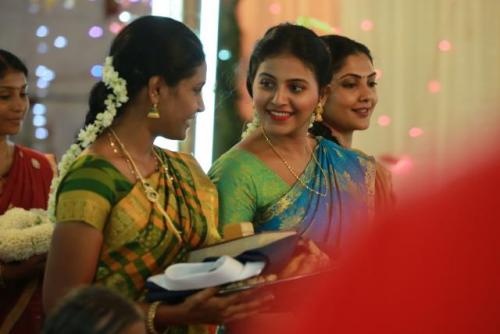
A brave Tamil film offers a different take on women empowerment and makes the concept universal, men included
MUCH LIKE its title, a word that does not exist in the Tamil lexicon, the movie “Iraivi” (meaning female Goddess) does not subscribe to the usual recipe of feminist films. Director Karthik Subbaraj (of Pizza and Jigarthanda fame) packages his feminism in the most unusual manner, and delivers a strong film.
Iraivi depicts feminist perspectives through the lives of its three male leads essayed by Bobby Simha, Vijay Sethupathi, and SJ Surya.
We are taken through the lives of three women Yazhini (Kamalinee Mukherjee), Ponni (Anjali), and Malar (Pooja Devariya). Yazhini opposes her parents to marry Arul (SJ Surya), a struggling film director, and tells her friend that she harbors many ambitions, and cannot live the “template life” of marriage and family.
Ponni’s goal in life is to get married and settle down with a good looking man who would pamper her. Malar is a widow who is involved in a purely physical relationship with Michael (Vijay Sethupathi), and prefers not to fall in love with him. She declines the proposal of marriage brought by Michael’s uncle. Michael then is made to marry Ponni, and accepts his wife only after Malar tells him to leave her and be a good husband.
Arul and Yazhini are shown to be parents of a girl, and their marriage always seems to be dependent on the plight of Arul’s unreleased film which is in the hands of a wicked producer. He and Jagan (Bobby Simha) are sons of a famous idol- maker, and to save his unreleased film, they steal the Goddess idols (Iraivi-s) made by his father, which are not being worshipped in temples anymore. He believes that they should be sold to parties who know the idol’s worth. The rest of the story is about where in life these recurring plans of theft take them and the women in their lives.
Apart from brilliance in all the technical departments, Iraivi’s strength lies in the strong characterisation, and situations you can relate to. Except for a couple of songs that seem unnecessary, Iraivi succeeds in telling the stories. Karthik Subbaraj doesn’t resort to any major physical or mental transformation to show the grit of his leading ladies. Instead, their supremacy lies in their ability to “handle” situations they are thrown into.
Karthik Subbaraj doesn’t resort to any major physical or mental transformation to show the grit of his leading ladies. Instead, their supremacy lies in their ability to “handle” situations they are thrown into.
What is also praiseworthy here is the responsible portrayal of the idea of “empowerment”. The metaphor of idol thefts seems to forward the thought that a woman needn’t always be put in a place where she is valued more to empower her. It is about commanding respect wherever you are.
in a place where she is valued more to empower her. It is about commanding respect wherever you are.
Ponni decides to “adjust” in the marriage, but does not allow her husband to question her chastity. Yazhini tries her best to save the marriage for the sake of her daughter, but does not succumb to her husband’s attempts to win her back when she has had enough.
Iraivi tells us that empowerment is not an exchange between the genders, but something that must come from within each woman.
Such films have immense importance in today’s times when the idea of empowerment is often portrayed very generically as “breaking free” from things. We forget that this very idea of breaking free is often contingent on highly subjective social and economic conditions. The film dares to paint on a wide canvas as we have women from different social and economic conditions, who have their own definition of empowerment and entitlement.
The ideas shown in the film might not be everyone’s cup of tea, but are sure to set the audience thinking. Feminist films mostly cater to a niche audience, but Iraivi has a message for all women, and most importantly, for men.
The ideas shown in the film might not be everyone’s cup of tea, but are sure to set the audience thinking. Feminist films mostly cater to a niche audience, but Iraivi has a message for all women, and most importantly, for men.
At a significant point in the film, Yazhini, who is watching the rain outside, says even though she would like to get drenched, she cannot. She believes that’s what the life of a woman entails. Ponni too wants to get drenched in the rain with her husband, but he constantly denies her that pleasure. In the end, the destinies of these characters take a different turn, and it rains again, heralding different journeys for the women of the film.
Iraivi is about getting drenched in the rain, but most importantly, it is about finding your sunshine.
Liked this story? GoI Monitor is a non-profit, and we depend on readers like you to Support Our Efforts
